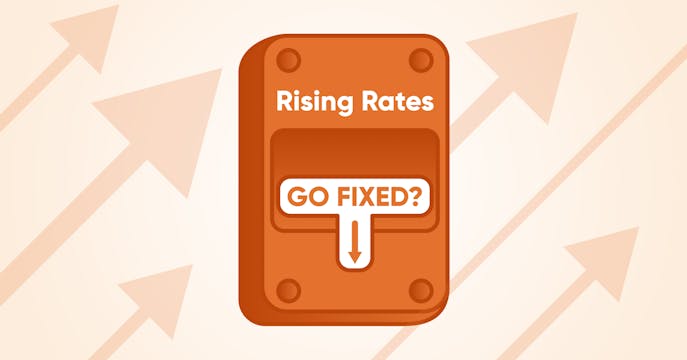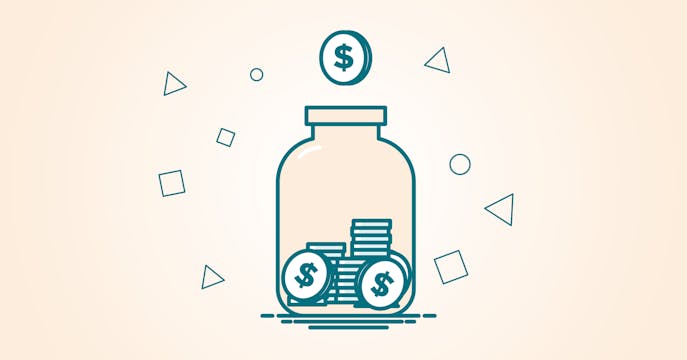"Four of the Big Five banks reported a large share of their portfolio had amortizations longer than 30 years in Q2 2023."
– Better Dwelling, May 26, 2023
Lowest Mortgage Rate in Canada. Starting from 2.49%
Hear something ticking?
Now's not the time to ignore your mortgage.
From higher variable mortgage rates, to upcoming fixed-rate renewals, to straining budgets and debt loads — take a moment to assess your mortgage needs.
First posted Dec. 6, 2022

Cut the wire with the right mortgage strategy.
(Wait, not the red one!)
Do higher mortgage rates have you feeling like a budget-bomb is ticking down?
While it may seem like your lender contract is wired against making major changes, like lowering your payments or switching to a better rate — you may have more flexibility than you think (and if you don't, that's another thing to solve).
We're pretty familiar with those (mortgage) wires. Here's what you can do to help diffuse your budget stress and potentially save money on your mortgage.
Beware your trigger point (if you've already hit your trigger rate).
"About three-quarters of [fixed-payment variable rate mortgages] have hit their 'trigger rate' ... but many banks are instead leaving monthly payments unchanged, and allowing the excess interest to pile onto the outstanding principal."
– David Parkinson, The Globe and Mail, May 19, 2023
Do you have a fixed-payment, Variable-Rate Mortgage (VRM) with a big bank? By now, you are likely well aware of the trigger rate lurking in your mortgage terms when, if hit, your payment no longer covers the interest portion.
Here's the ticking-budget-bomb part: For your static payments, once you hit your trigger rate — if you or your bank don't adjust your payment upwards, or you wait to put down a lump sum, that unpaid interest is being pushed onto your mortgage balance and lengthening your amortization (called negative amortization).
So while you're going about your day, your mortgage may be ticking up until it's too big for your budget to handle when it comes time to renew. Or before that, if your balance surpasses your critical trigger point.
What's your trigger point? For insured mortgages, it's when your balance exceeds 105% of your home's Fair Market Value (FMV), or 80% for uninsured mortgages. At that point, the bank will definitely take notice and require your immediate action to resolve — with either a lump sum or to take on much higher payments.
Lenders and insurers are trying to work with clients to cope with rising payments, though it's taken on a case-by-case basis, and you'll have to prove that you can no longer afford your mortgage payments.
What can you do?
Your big bank has limited solutions, so instead, talk to one of our expert brokers who can look around on your behalf:
- Locking into your best-possible fixed rate may help lower your payments now and get your amortization back in line.
- Switching lenders may offer a better rate and mortgage fit with more flexible payment options.
- A mortgage refinance may allow you to consolidate several debts into one mortgage payment to save on interest costs.
Clear some room for your floating variable-rate payments.
Feeling maxed out by the payment increases of your Adjustable Variable-Rate mortgage payments (ARM)?
What can you do?
If monthly cash is king, here are 2 ways to get some needed budget room:
- Have you paid lump sums on your mortgage during your term? You may be able to extend back to your original amortization (minus time lapsed) to lower your payments. A fee for this extension may apply (our in-house lender, THINK Financial, doesn't charge a fee for this service).
- Are you already several years into your mortgage? You may be able to refinance back out to 25 years (or even 30 years or more) to lower your payments.
In the future, if your mortgage has flexible pre-payment options, you can shrink your amortization down again through additional payments or lump sums if rates go lower and you have the extra cash.
Need to 'cut the cord' on more variable rate increases?
"All adjustable-rate borrowers (those whose payments vary as interest rates change) have already experienced payment increases, with some seeing their payments surge by more than 50%."
– Canadian Mortgage Trends, May 19, 2023
Are you tired of waiting and waiting for rates to trend back down again? Worried they may actually go up instead?
Or maybe you just want a lower payment — some fixed rates are lower than variable rates at the moment, thanks to volatile markets trying to anticipate when rates will start to drop.
What can you do?
- Switching to a lower fixed rate now will help eliminate your budget jitters and give you more room. Remember that if rates go down later, breaking a fixed-rate term to take advantage may incur more-costly penalties (fixed-rate IRD vs only 3 months interest with a variable rate).
- Choosing a fixed term shorter than the typical 5-year one (such as a 1, 2 or 3-year term) helps you 'wait out the rate clock' with a lower payment now and (hopefully) renew sooner into a better rate without penalty.
- Catch a break with 6 months of lower payments. True North's in-house lender, THINK Financial, offers some Rate Relief™ — a low fixed-rate, 6-month product that allows you some temporary budget room. If it's right for you, you can renew into any other mortgage rate type or term length that works for you (conditions and fees apply; THINK Financial offers some of the best rates in the industry).
Worried about your fixed rate exploding at renewal time?
If you bought a home before March 2022 on a fixed-rate term, your upcoming renewal might see your mortgage rate go 2 or 3% higher. And you may not realize that higher qualifying rates may now work against switching lenders for a better rate. Read more here for some True North tips to help keep your payments down.
Are you a first-time buyer that maxed out your home affordability?
If you find it challenging to handle the increasing payments of your variable rate or are concerned about your renewal (get a helpful reminder here), now's the time to get targeted advice to fix the stress.
Our brokers are real people who understand that saving even a few dollars can make a difference — to get some budget room now, change your payment frequency to get ahead on interest costs, or find debt-reduction strategies to help you better handle your mortgage payments.
Don't just take our word for it. Read our 5-star client reviews to see how we've helped clients save, and then give us a shout if you have questions or need a helping (mortgage) hand.
Offence can be the best defence. Invest in your mortgage to keep your savings in check.
With today's economic volatility and higher mortgage interest costs, invest in your mortgage now by focusing any extra funds toward your mortgage principal. It guarantees that you'll save some 'after-tax' cash by lowering your interest payments, plus act as a buffer against higher payments if you need the option to extend your amortization at renewal (any amount you put down helps reduce your amortization for some wiggle room).
Stop the clock and save the most.
A quick chat with your expert broker is all you need to ensure that your details are finely tuned heading forward.
Ask about portability (maybe you'll decide to move during your term), what pre-payment options you have (to pay down your mortgage faster), or a refinance (if you're planning on home upgrades and are wondering about your best rate).
Anywhere you are in Canada, our friendly True North Mortgage brokers are online, on the phone, or at a store near you — ready to have a great conversation about your mortgage needs.
It's up to you to make the call, and up to us to try help you.
We're focused on your best mortgage, here's more

What is portability?
If you move, can your mortgage (and rate) come, too? Learn about this feature.

Time to switch to a fixed rate?
Rate hikes got you nervous? Talk to us about pulling the switch.

All the ways to save on your mortgage.
Here are 12 great tips to help calm your (mortgage) budget woes.

